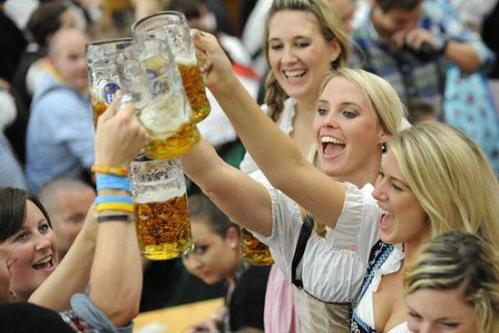CCTV9英语新闻:德国啤酒申请将纯净法列入世界遗产名录
German beer aims for World Heritage listing
German beer is famous the world over, and now the country wants to make it official, by having the United Nations recognize its 500-year-old brewing purity laws on its UNESCO World Heritage list. The UN already recognizes Spanish flamenco dancing, French cuisine and Iranian carpet weaving as world treasures. But is Germany’s beer an enshrined treasure or a tradition under threat?
In Germany to officially call a drink beer it can only contain four ingredients, barley, hops, yeast and water. It’s known as the purity law, or Reinheitsgebot in German.

Germans say the Reinheitsgebot is the world’s oldest food and drink regulation that is still in effect and cherished by drinkers, not just here in Germany, but right around the world.
The law was created in the 1500s by two German Dukes who didn’t want bread ingredients ending up in their beer. Next April the law celebrates its 500th birthday, but there’s trouble brewing.
"In Germany you just have the Pilsner, the wheat beer styles, there’s not much flavor."
"I think they should get rid of the Reinheitsgebot and start thinking of how to create more different flavours".
That would have once been heresy. Not anymore.
"The influence of the US and Scandinavia and the rest of the world on the brewing here means that the traditional brewers now feel under pressure to protect their brewing heritage." said Rory Lawton, Beer Tasting Operator.
German beer aims for World Heritage listing
That why Germany’s big brewers are seeking world heritage listing for the purity laws with UNESCO.
"Purity law is part of our culture, our traditions, and our identity." said Marc-Oliver Huhnholz, Spokesman, German Brewers Association.
Philipp Brokamp is part of a new breed of German brewers tonight mixing up a batch or controversial coffee flavored beer. But he also promotes many traditional recipes.
"I as a customer want to see it on the bottle, so I think its OK if there stands purity law beer that’s OK in my opinion, what’s not OK in my opinion is that you can’t brew behind these walls." said Philipp Brokamp, Owner, Hops & Barley.
The walls still leave plenty of room for experimentation according to the brewers union .
"Under the purity law you have one million possibilities or ways to brew beer only with these four ingredients so there is much space for new beers, interesting beers, with very good tastes when you are following the purity law." said Marc-Oliver Huhnholz, Spokesman, German Brewers Association.
Whether the United Nations lists the law or not it seems clearer than many German beers that the Reinheitsgebot will be celebrated for many years to come even if Germans continue developing a taste for new types of ’impure’ drinks that sure taste like beer, but can’t be labeled as such.